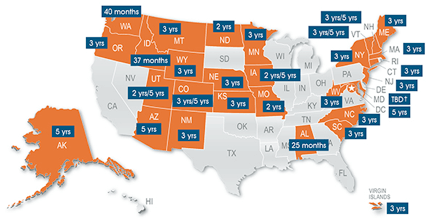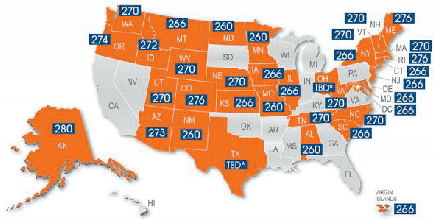Common Questions About the UBE.
What is the Uniform Bar Exam?
The Uniform Bar Exam (UBE) is effectively a national bar exam coordinated by the National Conference of Bar Examiners (NCBE) and is composed of three parts: (1) the Multistate Bar Examination (MBE) , the Multistate Essay Examination (MEE), and the Multistate Performance Test (MPT).
The UBE is uniformly administered, graded, and scored by adopting jurisdictions and results in a portable score that can be transferred to other UBE jurisdictions.
What does the Uniform Bar Exam application look like?
There is no Uniform Bar Exam application.
Applicants must register for the UBE by applying to a user jurisdiction. For example, a student taking the UBE in New York would apply to sit for the New York bar exam.
Applicants who have taken the UBE may transfer their UBE scores to seek admission in other UBE jurisdictions.
This map shows UBE jurisdictions in orange and lists the maximum age of transferred UBE scores for each jurisdiction:

| Maximum Age of Transferred UBE Score* | Jurisdiction |
| 2 years | Missouri, North Dakota |
| 2 years/5 years | Iowa, Utah |
| 25 months | Alabama |
| 3 years | Connecticut, Kansas, Maine, Massachusetts, Minnesota, Montana, Nebraska, New Jersey, New Mexico, New York, North Carolina, Oregon, South Carolina, Virgin Islands, West Virginia, Wyoming |
| 3 years/5 years | Colorado, New Hampshire, Vermont |
| 37 months | Idaho |
| 40 months | Washington |
| 5 years | Alaska, Arizona, District of Columbia |
*The maximum age of transferred UBE scores in Maryland has not been determined.
Please note, however, that jurisdiction rules and policies can change, so we would strongly advise consulting the jurisdiction’s bar admission agency directly for the most current information.
What States accept the UBE?

These are the UBE jurisdictions:
- Alabama
- Alaska
- Arizona
- Arkansas
- Colorado
- Connecticut
- District of Columbia
- Idaho
- Illinois
- Indiana
- Iowa
- Kansas
- Kentucky
- Maine
- Maryland
- Massachusetts
- Michigan (February 2023)
- Minnesota
- Missouri
- Montana
- Nebraska
- New Hampshire
- New Jersey
- New Mexico
- New York
- North Carolina
- North Dakota
- Ohio
- Oklahoma
- Oregon
- Pennsylvania
- Rhode Island
- South Carolina
- Tennessee
- Texas
- Utah
- Vermont
- Washington
- West Virginia
- Wyoming
- Virgin Islands
While technically not UBE jurisdictions, the following jurisdictions either administer or substantially administer the UBE:
- Hawaii
- Mississippi
- South Dakota
- Wisconsin
Are there states that are considering the UBE?
Every year more and more states are adopting the UBE.
In February 2021, the Texas bar exam will administer its first Uniform Bar Exam.
California and Florida are the largest legal markets still administering state-specific tests. While Florida has formally considered adopting the UBE, California seems to have no interest in doing so. The California bar exam , however, recently shorten from three days to two days, a step in the right direction.
What are the Uniform Bar Exam subjects?
Multistate Bar Exam Subjects:
- Civil Procedure (Civ Pro)
- Criminal Law and Criminal Procedure (Crimes)
- Torts
- Real Property
- Contracts
- Constitutional Law (Con Law)
- Evidence
Multistate Essay Exam Subjects:
-
Business Associations : Agency and partnership, and corporations and limited liability companies.
-
Civil Procedure (Civ Pro) : Jurisdiction and venue, the law applied by federal courts, pretrial procedures, jury trials, motions, verdicts and judgments, and appealability and review.
-
Conflicts of Law : These issues are embedded in other topic areas and do not appear as standalone questions. Issues include domicile, the jurisdiction of courts, choice of law, and recognition and enforcement of other states' judgments and foreign judgments.
-
Constitutional Law (Con Law) : Nature of judicial review, separation of powers, relation of nation and states in a federal system, and individual rights.
-
Contracts : Formation of contracts, defenses to enforceability, contract content and meaning, performance, breach and discharge, remedies, and third-party rights.
-
Criminal Law and Procedure (Crimes) : Homicide, other crimes, inchoate crimes; parties, general principles, and constitutional protection of accused persons.
-
Evidence : Presentation of evidence, relevancy and reasons for excluding relevant evidence, privileges and other policy exclusions, writings, recordings, and photographs, and hearsay and circumstances of its admissibility.
-
Family Law : Getting married, being married, separation, divorce, dissolution, and annulment, child custody, rights of unmarried cohabitants, parent, child, and state, adoption, and alternatives to adoption.
-
Real Property : Ownership of real property, rights in real property, real estate contracts, mortgages/security devices, and titles.
-
Secured Transactions : Assume articles 1 and 9 of Uniform Commercial Code are adopted and in effect. General UCC principles, applicability, and definitions, validity of security agreements and rights of parties, rights of third parties, default.
-
Torts : Intentional torts, negligence, strict liability and products liability, and other torts.
-
Trusts and Decendents’ Estates : Intestate succession, wills, family protection, living wills and durable healthcare powers, and trusts and future interests.
What’s the best way to study for the UBE?
BarMax UBE offers comprehensive prep for the Uniform Bar Exam for only $1,895.
The course comes with instant and lifetime access as well as a pass guarantee.
In addition to on-demand audio lectures by legendary law professors, BarMax UBE offers condense black-letter law outlines, flashcards, and the largest banks of real MBE, MEE and MPT questions on the market.
BarMax UBE also includes a detailed course calendar to guide you as you prep.
And while BarMax is a remote learning process, this does not mean you will be alone. You will have access to chat, email and message boards for content-related questions as well as personalized writing revisions by former bar exam graders.
What are the Uniform Bar Exam dates?
The UBE is administered twice a year over two days, with the MBE portion given on the last Wednesday of February and July and the MEE and MPT given on the Tuesday prior to that.
How is the UBE scored?
The NCBE scores the MBE component of the UBE. Jurisdictions grade the MEE and MPT components.
The MEE and MPT scores are scaled to the MBE and UBE total scores are calculated by the NCBE.
The MBE is weighted 50%, the MEE 30%, and the MPT 20%.
UBE total scores are reported on a 400-point scale.
Jurisdictions set their own minimum passing scores for the UBE:
What’s the Uniform Bar Exam format?
The UBE consists of three sections: the Multistate Bar Examination (MBE), the Multistate Essay Examination (MEE), and the Multistate Performance Test (MPT).
The format is as follows:
Tuesday AM: 6 30-minute Multistate Essay Questions
Tuesday PM: 2 90-minute Multistate Performance Tests
Wednesday AM: 100 MBE Questions (3 hours)
Wednesday PM: 100 MBE Questions (3 hours)
What’s the difference between the UBE and the MBE?
The Multistate Bar Examination (MBE) is a six-hour, 200-question multiple-choice examination developed by NCBE and administered by user jurisdictions as part of the bar examination on the last Wednesday in February and the last Wednesday in July of each year.
The MBE is a component of the Uniform Bar Exam (UBE). Jurisdictions that administer the UBE weight the MBE component 50%.